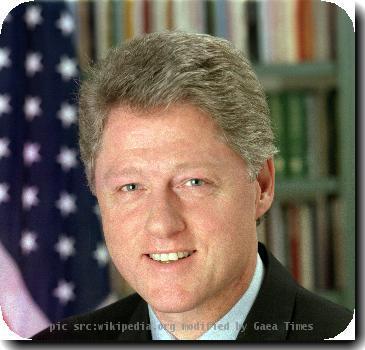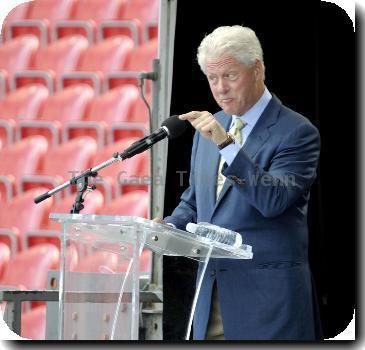As Rwanda’s August election nears, critics fear country’s president is smashing dissent
By Jason Straziuso, APMonday, June 28, 2010
Violence rises in Rwanda as election nears
NAIROBI, Kenya — Former U.S. President Bill Clinton presented Rwanda’s leader with a global citizen award last fall and lauded him for freeing the minds of his people. Now as an election approaches, critics fear Paul Kagame’s government is instead smashing dissent.
A former dissident general has been shot, an opposition Rwandan journalist killed and an American lawyer jailed in the run-up to the August presidential vote. A top opposition political party says some of its members have been beaten by police while in detention and that one is missing.
Rwanda’s government insists it played no part in either the general being shot or the journalist being killed, and the country’s top spokeswoman accused “frustrated” politicians of suggesting that a crackdown is under way.
But human rights groups say the government is ensuring that opposition parties are excluded from the political process.
“It has been extremely worrying for quite some time,” said Carina Tertsakian, a researcher at Human Rights Watch who specializes in Rwanda. “Rwanda is a country where there is not much freedom of expression, but in the months leading up to the August elections we really have seen a further crackdown on any form of opposition, dissent or criticism,” she said.
International accounts of Rwanda’s 1994 genocide say at least 500,000 ethnic Tutsis and moderate Hutus were killed. The violence ended when Kagame led a Tutsi-dominated force into the country and he has been in power ever since.
The government has tried to reduce the role ethnicity plays in society today, fearing a return to violence. Rwandan authorities have likened their laws against genocide denial to Germany’s laws against Holocaust denial, and defend them as necessary for keeping the peace.
The country’s most prominent opposition politician, Victoire Ingabire, believes Kagame’s government is marginalizing ethnic Hutus. Ingabire, who is under house arrest and faces charges of genocide ideology, said Monday that members of her party have been “tortured” while in police custody.
“Our country is on the brink of chaos,” Ingabire said. “The rising tension, nervousness, repression and the shrinking of the political space call for the postponement of the presidential elections. Otherwise the elections masquerade (parade) only the ruling party and its allied groups while excluding the opposition leaders.”
A dissident former Rwandan general, Kayumba Nyamwasa, was shot near his home earlier this month in South Africa by assailants who did not attempt to steal anything. Opposition journalist Jean-Leonard Rugambage was killed in the Rwandan capital late Thursday.
The paper Rugambage worked for, Umuvugizi, last week published an article online alleging the Rwandan government was behind the attempted murder of Nyamwasa, an allegation the government denies. The former general, once a close ally of Kagame, had become an increasingly outspoken critic of Rwanda’s government.
Louise Mushikiwabo, the minister of Foreign Affairs and the government spokeswoman, said Rwanda does not kill its own people, and that if it has a problem with someone it will take them to court.
“There is this whole psyche that there is a crackdown in Rwanda, that tensions are reigning,” said Mushikiwabo. “People are taking advantage of the forthcoming elections to project this kind of situation, but I can assure you that the situation is created.”
Rwandan police said two suspects in Rugambage’s killing were arrested over the weekend. A statement from police said one suspect was related to a person said to have been killed by Rugambage during the 1994 genocide, “implying that the killing might have been conducted as revenge,” the police statement said.
Tertsakian said she believes the theory that the government killed Rugambage should not be ruled out. Human Rights Watch noted over the weekend that Mushikiwabo, the government spokeswoman, said last July that the “day of the destructive press are numbered.” Soon afterward two papers, including Umuvugizi, were suspended for six months.
Tertsakian herself earned the wrath of Rwanda’s government earlier this year and was kicked out of the country. The government said that Tertsakian falsified information on her visa application, an allegation the researcher denies. Human Rights Watch said in April that the Rwandan government has increasingly obstructed the work of its organization.
Erlinder, the American lawyer, was released earlier this month on medical grounds but he said he believed the government wanted to make him “disappear.”
“Did I fear for my life? Only every minute,” Erlinder told The Associated Press about his time in prison.
Erlinder disputes the generally accepted version of Rwandan history, which holds that the vast majority of victims were ethnic Tutsis massacred by extremist Hutus. He contends large numbers of Hutus were killed too, maybe more Hutus than Tutsis — a claim not supported by research done by international human rights organizations.
Erlinder has been involved with Rwanda since 2003 through his work as a defense lawyer with the Tanzania-based International Criminal Tribunal for Rwanda, which was created by the U.N. Security Council to prosecute those accused of responsibility for the genocide.
He traveled to Rwanda to represent Ingabire but says he can no longer effectively represent her.
Ingabire’s opposition party, FDU-Inkingi, and one other have not been able to register, meaning their candidates cannot run. A third opposition party has been “hijacked” by a group manipulated by Kagame’s political party, Tertsakian said.
Security in African countries tends to be a concern around election time, said Nyambura Githaiga, a researcher for the South Africa-based Institute of Security Studies. She said that given the history of Rwanda’s genocide, it’s not surprising the government would respond to any perceived threats to national stability.
“My view is that the Rwandan government may be heightening security ahead of the August polls but only time will tell if this is inordinately so,” Githaiga said.
Associated Press Writer Edmund Kagire in Kigali, Rwanda contributed to this report.
Tags: Africa, Arrests, Bill Clinton, East Africa, Genocides, Kenya, Nairobi, Rwanda, Violence

